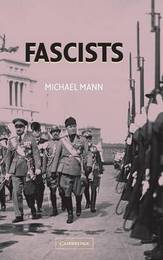
|
Fascists
Hardback
Main Details
Description
Fascists presents a new theory of fascism based on intensive analysis of the men and women who became fascists. It covers the six European countries in which fascism became most dominant - Italy, Germany, Austria, Hungary, Romania and Spain. It is the most comprehensive analysis of who fascists actually were, what beliefs they held and what actions they committed. The book suggests that fascism was essentially a product of post World War I conditions in Europe and is unlikely to re-appear in its classic garb in the future. Nonetheless, elements of its ideology remain relevant to modern conditions and are now re-appearing, though mainly in different parts of the world.
Reviews'Mann's master-class in the comparative study of fascism ... Fascist is a scholarly and highly 'recommendable' text book ... Mann has done comparative fascist studies a great service by applying his compendious sociological knowledge to the major movements of revolutionary ultra-nationalism in inter-war Europe.' History Today 'Michael Mann's masterly analysis places fascism 'at the heart of modernity.' The Tribune 'Mann's Fascists is an impressive book by any standards. It deals skilfully and fair-mindedly with a vast empirical literature ... Mann crafts an original and well-documented central argument. Many of his trademark strengths as a sociologist are powerfully on display. He is excellent on the religious and regional dimensions of his problem and, while forcefully making his own case, is careful to consider the relative merits of what he takes to be the most significant alternatives.' New Left Review 'Mann has, once again, produced an exemplary and masterful work of comparative historical sociology. The book is beautifully written, and brimful of rich sociological and historical material, providing an extremely lucid and easy to comprehend source for students in the field of comparative fascist studies and beyond. Equally, political scientist, comparative political sociologists, and historians of twentieth-century Europe will gain a great deal from reading and engaging with this important and sophisticated text.' Modernism/Modernity 'This is a fascinating study that anyone concerned with fascism would benefit from reading. The evidence it brings to bear is testimony to the wide range of work that the author has consulted, and the argument he makes and the distinctions he draws between it and other approaches mark it as a significant new contribution ...' Ethnic and Racial Studies '... a highly recommended book for both academics and students. It bridges the gap between history and sociology and brings nationalism, statism and violence back to the centre of the analyses of fascism. Historians, sociologists and political scientists will benefit from reading this refreshing and lucid book.' Nations and Nationalism 'Mann has provided the scholarly community with a fine study of fascism and tis followers, and has simultaneously provided a thought-provoking critique of traditional approaches to the topic ... Both the theory itself, and the bold style in which is is presented are bound to stir debate over what will almost certainly become a seminal work in the area of fascist studies.' Patterns of Prejudice
|